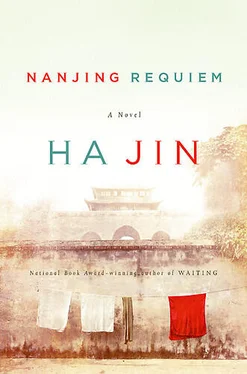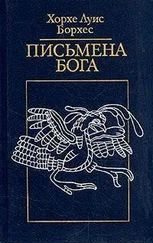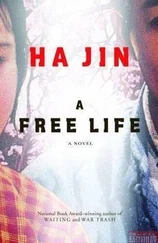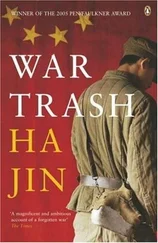I showed the photograph to nobody but Minnie. “What a nice picture,” she said. “Mother and son look so content. What does Mitsuko do for a living?”
“She teaches primary school.”
“If I were you, I’d go see them right away.”
“Minnie, you’re American, but few Chinese can do that while the war is going on. Please don’t reveal my family’s Japanese relations to anyone, okay?”
“Sure, I’ll keep my lips zipped.”
We went on to talk about the three teenage girls — Meiyan and two classmates of hers — who had just run away, claiming that they wanted to join the resistance force in some interior region. Our staffers intercepted them at the train station in Hsia Gwan, because they didn’t have the travel papers necessary for purchasing tickets and were stranded there. I reprimanded the girls and wanted to make them do kitchen duty for a week, which Big Liu supported, but Minnie intervened, saying they had to take the finals they had missed. She gave them a few days to review their lessons.
Meiyan came to our home to see Liya that evening, to return the ten yuan she had borrowed from her for the secret journey. They were friends now, but Meiyan would remain reticent in my presence, so I stayed in the kitchen feeding Fanfan while listening in on the two of them in the sitting room.
“Sorry I didn’t tell you my plan,” Meiyan said. “I was afraid your mom would let my dad know.”
“No big deal,” Liya replied. “If I didn’t have a child, I might run away too.”
“Where would you like to go? To join your husband?”
“I have no clue where he is. I just want to join our army.”
“Which one — the Nationalists or the Communists?”
“It makes no difference as long as I can fight the Japanese. They killed my baby, and I still see my daughter now and then.” Liya believed that the lost baby had been a girl, perhaps because she’d never had morning sickness during the pregnancy.
“I’m glad you’re not mad at me.”
“Where were you three headed?”
“We just planned to go upriver. We really didn’t have a concrete destination in mind.”
“Didn’t you want to join the resistance force?” asked Liya.
“We did, but to be honest, I wouldn’t mind settling down in a peaceful place where nobody knows me. I want to live a quiet life too.”
“Where can you find a place like that now?”
“That’s the problem — the only option left is to join the resistance. If there were a convent that’s intact, I wouldn’t mind going there.”
“Come on, don’t you want to find a good man and have a family?”
“Not until we drive the Japanese out of our country.”
I mulled over their conversation, which changed my impression of Meiyan somewhat. I used to think she was just a hothead, but now I could see that she was also longing for a normal life.
SOON AFTER CHRISTMAS, a former schoolmate of Yaoping’s back in Japan came to see him. The man was tall and well turned out, wearing a business suit and patent-leather shoes. He looked like a middle-aged dandy, his hair pomaded shiny and his face somewhat bloated, but he was agreeable, spoke amiably with a northeastern accent, and called me sister-in-law. He used a long umbrella as a walking stick. Yaoping took him into our inner room, where they talked over tea and spiced sunflower seeds for hours, deep into the night. Now and then I went in with the teakettle and refilled the pot for them. I didn’t go to bed but instead drifted off in a chair in the sitting room. Their voices rose and fell; at times they seemed to be arguing.
After the man left, my husband became restless, pacing the floor and smoking his pipe. He let out a long sigh and shook his head.
“What did he want?” I asked Yaoping about the visitor.
“They’re preparing to establish a new national government, and he asked me to join them.”
“So they offered you a job?”
“Yes.”
“In what office?”
“The Ministry of Culture or the Ministry of Education.”
“Doing what?”
“A vice minister.”
“That’s big!”
“I know. Obviously they’ve run out of candidates for the top jobs. Under normal circumstances no one would think of me for a position like that. But I mustn’t serve in a puppet government. That would be treason and no one would forgive me for that. Imagine what would happen to me if China wins the war.”
“Do you believe we will win?”
“I’m not sure, but the uncertainty doesn’t justify any official role in a puppet government. I cannot ruin our family’s name that way. Besides, our son’s already in the Japanese clutches.”
“I agree. Did you decline the offer?”
“Of course not. I couldn’t turn it down flatly. That would be suicidal, so I told him I would seriously consider the offer. The man talked at length about saving our country by taking a roundabout path.”
“What does that mean?”
“He said we should cooperate with the Japanese so that we could at least prevent some parts of China from being totally destroyed and annexed. I couldn’t contradict him.”
“That kind of talk is based on the assumption that Japan will win the war.”
“True, but what should I do?”
“When are you supposed to give him an answer?”
“In three days.”
“Can’t you hide somewhere? Say, go to Searle’s or Lewis’s?”
“Well, the national puppet government will be established here, so if they find out I’m still in town, they’ll never leave me alone. Heavens, it looks like I can’t stay here anymore.”
I was glad Yaoping wasn’t swayed by the temptation, though he used to talk a lot about how he liked Japan, even Japanese things (he had once owned a Seiko pocket watch with a compass on the inner side of the copper lid). But this wasn’t just a matter of his personal integrity or preserving our family’s name. If he served in the prospective puppet government, he might be killed by the underground partisans. Even if they didn’t finish him off, he would eventually be punished by the Nationalists or the Communists. He would become a public enemy and our family would suffer on his account.
Having talked for hours, we decided that he should leave for Sichuan to join his university there. We considered whether all of us should go with him, but thought that this would attract too much attention. Besides, I could not abandon my job here. I urged him to set off without delay.
The next evening he left for Cow’s Head Hill in the south, where he could stay with a friend temporarily. He took along a handbag and a duffel stuffed with half a dozen books and two changes of clothes. Having no travel permit, he would walk and hitchhike to get out of the areas occupied by the Japanese, and then eventually take a boat or train inland. I gave him all the cash we had, about eighty yuan, and told him not to drink too much tea, which might aggravate his arthritis. Before getting on the rickshaw, he hugged me, Liya, and Fanfan, saying he would miss us terribly. Then he climbed into the vehicle, waving at us. We watched his lean face blurring in the dark until it vanished.
RUTH CHESTER WROTE BACK, saying they’d found a place in Shanghai for the five blind girls. We were delighted, and Minnie asked Rulian to send the girls there. The blind girls were reluctant to leave, but we assured them that they’d be better educated and better cared for in the specialized school. Better yet, Shanghai was safer than Nanjing. Minnie gave them each three yuan; the cash had been donated by a Japanese officer, Major Toshikawa, who had visited Jinling twice and was moved by the classes, saying that his daughter was going to a Christian school in Kobe. We didn’t tell the girls, or anyone else, where the money was from, but the five recipients were happy.
Читать дальше











